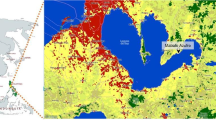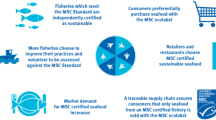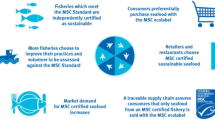Abstract
Environmental effects of salmon farming are controversial issues. In Northern Norway, cod fishers argue that the location of salmon pens in fjords results in the cessation of local cod spawning. Research supporting or rejecting such statements is scant. There is an absence of both short-term and long-term studies on the effects that salmon farming may have on wild fish stocks. There are few studies of local ecosystem relationships in general. This article explores fishers’ arguments about the effects of salmon farming. It discusses methods of assessing the reliability and validity of fisher knowledge, and contributes to the discussion on assets and limitations of narrative data and experiential knowledge.

Similar content being viewed by others
Notes
All fisher names in the article are fictive.
It is difficult to translate the Norwegian names but they express stationary behavior.
References
Ames, E. P. (1998). Cod and haddock Spawning Grounds in the Gulf of Maine from Grand Manan Channel to Ipswich Bay. In von Herbing, H., Kornfield, I., Tupper, M., and Wilson, J. (eds.), The Implications of Localized Fish Stocks, NRAES, Itacha, pp. 55–65.
Anon. (1999). Norges Muligheter for Verdiskapning Innen Havbruk. Utredning fra Arbeidsgruppen for Havbruk Oppnevnt av Det Kongelige Norske Videnskabers Selskab og Norges Tekniske Vitenskapsakademi, NTNU/SINTEF, Trondheim.
Anon. (2003). Aquaculture and Fisheries 2003, The Norwegian Ministry of Fisheries, Norway.
Berg, E. (2001). Norsk kysttorsk. I. In Iversen, S. (ed.), Havets Ressurser. Fisken og havet, særnummer 1: 18–19.
Berg, E., and Pedersen, T. (2001). Variability in Recruitment, Growth and Sexual Maturity Of Coastal Cod (Gadus morhua L.) in A Fjord System In Northern Norway. Fisheries Research 52: 179–189.
Berkes, F., and Folke, C. (eds.) (1998). Linking Social and Ecological Systems: Management Practices and Social Mechanisms for Building Resilience, Cambridge university Press, Cambridge.
Blaber, S. J. M., Milton, D. A., Rawlinson, N. J. F., Tiroba, G., and Nichols, P. V. (1990a) Reef fish and fisheries in Solomon Islands and Maldives and their interaction with tuna baitfisheries. In Blaber S. J. M., and Copland, J. W. (eds.), Tuna Baitfishing in the Indo-Pacific Region, ACIAR Proceedings no. 30, pp. 159–168.
Blaber, S. J. M., Milton, D. A., Rawlinson, N. J. F. (1990b) Diets Of The Fishes Of The Solomon Islands: Predators Of Tuna Baitfish And Trophic Effects Of Baitfishing On The Subsistence Fishery. Fisheries Research 8: 263–286.
Brander, K. M. (1994). Spawning and life history information for North Atlantic cod stocks. ICES cooperative research report, 205, ICES, Copenhagen, pp. 150.
Callon, M. (1986). Some elements of a sociology of translation: domestication of the scallops and the fishermen of St. Brieuc Bay. In Law, J. (ed.), Power, production and Belief: A New Sociology of Knowledge? Sociological Review Monograph, 32, Routledge and Kegan Paul, London, pp. 196–233.
Davis, D. L. (2000). Gendered cultures of conflict and discontent. Living ‘the crisis’ in a Newfoundland community. Women’s Studies International Forum 23(3).
Davis, D. L., and Nadel-Klein, J. (1988). To Work and to Weep: Women in Fishing Economies. Social and Economic Papers 18, Institute of Social & Economic Research, Memorial University of Newfoundland, St. John’s.
Davis, A., and Wagner, J. R. (2003). Who Knows? On the Importance of Identifying “experts “ When Researching Local Ecological Knowledge. Human Ecology 31(3): 463–489; Sept 2003.
Dyer, C. L., and McGoodwin, J. R. (eds.) (1994). Folk Management in the World’s Fisheries. Lessons for Modern Fisheries Management, University Press of Colorado, Colorado.
Eythórsson, E. (1993). Fjordfolket, fisken og forvaltningen. Rapport Finnmark Distriktshøyskole, Alta, Norway, p. 12.
Felt, L. F. (1994). Two tales of a fish: the social construction of indigenous knowledge among Atlantic Canadian salmon fishers. In Dyer, C. L., and McGoodwin, J. R. (eds.), Folk Management in the World’s Fisheries. Lessons for Modern Fisheries Management, University Press of Colorado, Colorado, pp. 251–287.
Freeman, M. R., and Carbyn, L. N. (eds.) (1988) Traditional Knowledge and Renewable Resource Management in Northern Regions. Occasional Publication Number 23, Canadian Circumpolar Institute, University Of Alberta, Edmonton, Alberta, Canada.
Freeman, M. R., Bogoslovskaya, L., Caulfield, R. A., Egede, I. Krupnik, I. I., and Stevenson, M. G. (1998). Inuit, Whaling, and Sustainability, Sage, Walnut Creek, London.
Glaser, B. G., and Strauss, A. L. (1967). The Discovery of Grounded Theory: Strategies for Qualitative Research, Aldine de Gruyter/New York.
Hamilton, R. (1999). Tidal Movements and Lunar Aggregating Behaviours of Carangidae in Roviana Lagoon, Western Province, Solomon Islands. MSc thesis, University of Otago, Otago.
Inglis, J. T. (ed.) (1993). Traditional Ecological Knowledge: Concepts and Cases. International Program on Traditional Ecological Knowledge/International Development Research Centre, Canadian Museum of Nature, Ottawa.
Jakobsen, T. (1987). Coastal Cod in Northern Norway. Fisheries Research. 5: 223–234.
Johannes, R. E. (1978). Traditional Marine Conservation Methods in Oceania and their Demise. Annual Review of Ecology and Systematics 9: 349–364.
Johannes, R. E. (1981). Words of the Lagoon: Fishing and Marine Lore in the Palau District of Micronesia, University of California Press, Berkeley and Los Angeles, CA.
Johannes, R. E., Freeman, M., and Hamilton, R. J. (2000). Ignore Fishers’ Knowledge And Miss The Boat. Fish and Fisheries 1: 257–271.
Knudsen, S. (2001). Entangled Knowledge of the Black Sea. Confrontation and Convergence Between Turkish Fishermen and Marine Scientists. Thesis submitted for the Dr. Polit Degree, Dept. of Social Anthropology, University of Bergen, Norway.
Latour, Bruno (1987). Science in Action: How to Follow Scientists and Engineers Through Society, Harvard University Press, Cambridge.
Maurstad, A., and Sundet, J. H. (1998). The invisible cod: fishermen’s and scientists’ knowledge. In S. Jentoft (ed.), Commons in Cold Climate: Reindeer Pastoralism and Coastal Fisheries, Parthenon, Casterton Hall, pp. 167–185.
Neis, B., and Felt, L. (eds.) (2000). Finding Our Sea Legs: Linking Fishery People and their Knowledge with Science and Management, ISER, Memorial University of Newfoundland, St. John’s, Canada.
Neis, B., and Morris, M. (2002). Fishers’ ecological knowledge and fisheries science: the Capelin fishery, 1975–1996. In Ommer R. E. (ed.), The Resilient Outport: Ecology, Economy, and Society in Rural Newfoundland, ISER, St. John’s, pp. 205–240.
Neis, B., D. C. Schneider, L. Felt, R. L. Haedrich, J. Fischer, and J. A. Hutchings (1999). Fisheries Assessment: What Can Be Learned From Resource Users? Canadian Journal of Fisheries and Aquatic Sciences 56: 1949–1963
Newell, D., and Ommer, R. E. (eds.) (1999). Fishing Places, Fishing People. Traditions and Issues in Canadian Small-Scale Fisheries, University of Toronto Press, Toronto, Canada.
Rollefsen, G. (1954). Observations On The Cod And Cod Fisheries Of Lofoten. Rapportes et Procès-Verbaux des Réunions Conseil permanent International pout l’Exploration de la Mer 136: 40–47.
Smedbol, R. K., and Wroblewski, J. S. (2002). Metapopulation Theory And Northern Cod Population Structure: Interdependency Of Subpopulations In Recovery Of A Groundfish Population. Fisheries Research 55:161–174.
Sæther, B., Bjørn, P. A., and Dale, T. (2007) Behavioural responses in wild cod (Gadus morhua L.) Exposed to fish holding water. Aquaculture 262: 260–267.
Wenzel, G. W. (1999). Traditional Ecological Knowledge and Inuit: Reflections on TEK Research and Ethics. Arctic 52(2): 113–124.
Wroblewski, J. S. (1998). Substocks of northern cod and localized fisheries in Trinity Bay, Eastern Newfoundland and in Gilbert Bay, Southern Labrador. In von Herbing, H., Kornfield, I., Tupper, M., and Wilson, J. (eds.), The Implications of Localized Fish Stocks, NRAES, Itacha, pp. 104–116.
Acknowledgements
First of all we want to thank all the fishermen who willingly shared with us their knowledge of the local fisheries history. It was they who made writing this paper possible. We are also grateful to the Fishery and Aquaculture Research Foundation that provided financial support for the study.
Author information
Authors and Affiliations
Corresponding author
Rights and permissions
About this article
Cite this article
Maurstad, A., Dale, T. & Bjørn, P.A. You Wouldn’t Spawn in a Septic Tank, Would You?. Hum Ecol 35, 601–610 (2007). https://doi.org/10.1007/s10745-007-9126-5
Published:
Issue Date:
DOI: https://doi.org/10.1007/s10745-007-9126-5




